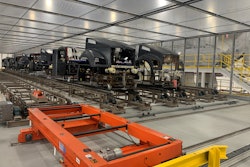Trucking news and briefs for Tuesday, Oct. 11, 2022:
DOL proposes to rescind, replace Trump-era independent contractor rule
The Department of Labor on Tuesday announced a Notice of Proposed Rulemaking that would reverse one of President Donald Trump's last acts in office by returning to the department's prior analysis for determining employee or independent contractor classification under the Fair Labor Standards Act.
The Trump-era rule only took effect in March. It was allowed to go into effect following a court ruling striking down the Biden DOL's withdrawal of the rule a year earlier. The Biden Administration had delayed the rule shortly before it was set to take effect before the May 2021 withdrawal. DOL's NPRM that will publish in the Federal Register Thursday attempts to fully rescind the Trump administration's rulemaking.
"The Department of Labor is proposing this rule to replace a rule adopted by the last administration which risked increasing rather than decreasing misclassification" of workers by narrowing the testing criteria used by businesses and employees to determine their status, said DOL Solicitor of Labor Seema Nanda.
The DOL said that the 2021 rule, which made it slightly easier to classify workers as contractors, was "out of sync with what courts have been saying for decades," and it hoped the revision would clear up "confusion" among businesses and workers and hopefully see more low-wage workers receive benefits and overtime pay as is required by the FLSA.
Trucking, of course, is exempt from the FLSA's overtime clause, and the DOL said this rule would likely not lead to workers being reclassified, but rather it would aim to eliminate misclassification in the future. Furthermore, this will not impact California's AB 5 rule or its ABC criteria for determining contractor status.
"We don’t anticipate this framework would really result in worker classification being changed, but it's guidance to avoid and prevent" future misclassifications, said Principal Deputy Wage and Hour Administrator Jessica Looman.
Essentially, the Trump-era rule had a test to determine if a worker was independent or an employee that relied on five factors, but put greater emphasis on two. The previous test, which DOL now hopes to restore, has six factors all weighted equally in what it calls "a totality-of-the circumstances analysis" which considers the worker's "economic reality."
The full text of the proposed rulemaking is here. When the comment period opens on October 13, readers can make comment here for 45 days.
First Tesla Semi deliveries set for December
The wait for delivery of Tesla’s long overdue Semi will soon be over, at least for one fleet -- Pepsi.
Tesla CEO Elon Musk last week tweeted that production on his company’s “500 mile range & super fun to drive” electric tractor would soon commence with “deliveries” set for December 1. PepsiCo ordered 100 Semis in December 2017, just weeks after the truck made its debut and told Overdrive sister publication CCJ at that time it would deploy the trucks across its snacks and beverage businesses. Pepsi expected to get 15 Tesla Semis last year before production was delayed again as part of the drink and snack company's Near Zero-Emission Freight Facility Project in Modesto, California.
Tesla's not offered formal updates on Semi in years, so it is not known how many of the 100 will be delivered in December, if Pepsi still holds reservations for 100 units, or why Pepsi was selected to get the first batch of trucks when they were not the first carrier to place an order.
Musk offered no details on how the tractor achieves its purported 500-mile range, which is about twice that of Volvo’s VNR Electric and Freightliner’s eCascadia -- two models that have been in customer hands for two and three years, respectively.
The Semi was originally set for production in 2019, and that date has been delayed at least three times in the past three years as legacy OEMs like Paccar, Volvo, Mack and Freightliner place multiple electric trucks with fleet customers. BEV upstart Nikola has also built and delivered upwards of 50 models and targets to have 500 out by year end.
[Related: The man on a mission to electrify log-hauling in a '62 Kenworth]
Great Dane recalling nearly 2,500 trailers for brakes issue
Great Dane Trailers is recalling approximately 2,439 model year 2023 Everest reefer and Champion dry van trailers in which the retaining clip in the brake pad retaining assembly may be loose or could detach, loosening the brake pad.
According to National Highway Traffic Safety Administration documents, the affected trailers are equipped with Holland axles provided with Haldex disc brakes manufactured at the Haldex Monterrey Facility starting with initial production Feb. 11, 2021, and ending when containment was implemented on Sept. 15, 2022.
The recall states that a retaining clip or bracket that detaches can damage the brake pad, reducing brake performance; damage a tire valve, causing a flat tire; or become a road hazard, increasing the risk of a crash.
Great Dane dealers will inspect and, if necessary, repair the spring bracket assembly, free of charge. Owners can contact Great Dane's customer service at 1-877-369-3493. NHTSA’s recall number is 22V-734.










